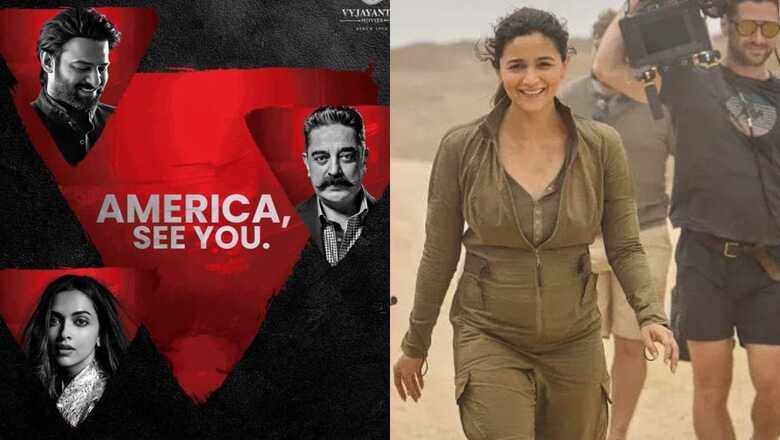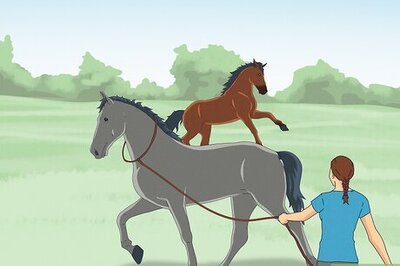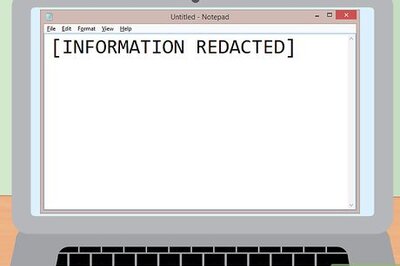
views
Labour activism has reportedly witnessed a rise following the Covid-19 pandemic. Artificial intelligence has taken over several sectors, including the arts. On May 2 this year, the Writers Guild of America (WGA), representing about 11,500 screenwriters, went on strike over a dispute with the Alliance of Motion Picture and Television Producers (AMPTP) following six weeks of negotiation. Increased residuals from streaming platforms remain an integral demand of the writers. They have been protesting outside the headquarters of Disney and Netflix in the USA demanding an increase in the size of writers’ rooms. They have also been raising their voice against the dwindling pay and the inference of artificial intelligence in their creative jobs.
About two months later, what has further fuelled this protest is another strike by the American actors’ union, SAG-AFTRA. More than 1,50,000 television and film actors from Hollywood have joined the screenwriters on July 14, thus making it Hollywood’s first industry-wide shut down in more than six decades. In support of the SAG-AFTRA strike, the red carpet event for Oppenheimer’s US premiere stood cancelled. In fact, cast members like Cillian Murphy, Matt Damon and Emily Blunt recently left the UK screening midway.
Though actors have been fighting their own battles and voicing their own set of grievances, writer Saiwyn Quadras believes that it has brought the spotlight back to the screenwriters. “They aren’t together in this. Each one is struggling for their own rights. But all of this is going to impact the studios in a certain manner. The writers’ strike has been on for 12 weeks and very little has come up about that. It was only reported in the beginning for a week or ten days and then it went silent, because who cares for a writer’s voice? But now, the actors of Oppenheimer have walked off the promotions. That’s why this strike is going big again,” he explains.
Quadras, whose next project is Ajay Devgn starrer Maidaan, wishes for ripples to be created in the Indian film industry as a reflection of the strike in Hollywood but worries that the light at the end of the tunnel is rather dim. He elaborates, “The reality might be a little different. I’m skeptical. Yes, we’ve the same platforms operating in India like Netflix, Amazon and Disney+ Hotstar. But even before the strike, these platforms had certain clauses writers had to work under and they were way different than the clauses that are there internationally. It’s like they operate in a completely different planet. If the studios do accept the demands of the writers internationally, we can hope that there can be standard practices all over the world including India with regards to especially the writers. That’s a hope but I don’t think it’s going to happen.”
Writer and creator Suparn S Varma, who shot to fame with Amazon Prime Video’s The Family Man, on the other hand, is hopeful and believes that conversations to bring about positive changes for writers in India have already begun. “The good part is that we live in a world today that’s much more educated. Producers and platforms are taking note of the fact that everything begins with the writers and they need to be given respect. A lot has changed in the last 10-15 years and hopefully will change more even though we’re a very long way from things that the WGA and the SAG-AFRA are fighting for,” he points out.
He goes on to explain, “The more educated writers are about their rights and producers are about a writer’s rights, the pay and functioning changes. And it’s changing slowly. Conversations will keep happening between the two. They can’t exist without each other – a producer is nothing without a script and vice-versa. It’s a symbiotic relationship. Both needs to co-exist. It’s all about respecting each other. Changes take time. They’re happening gradually. Conversations are also happening, maybe not at this advanced stage. We may not see the results of this conversation but somebody surely will.”
Filmmaker-writer Bejoy Nambiar also feels that the explosion of the digital space has brought writers their due respect. “After the OTT boom, our writers now have way more opportunities and power in demanding fair credit and remuneration. I hope that momentum keeps going and the writers get credited and paid properly going forward. We’ve seen that shift happening in the last couple of years and I hope it continues,” he states.
However, Nambiar’s doubts that the WGA protests in Hollywood can ‘trickle down in India’ and he attributes the same to the absence of a solid writers’ union in the country. “We can’t compare the two industries. They have a bigger union and structure in place. We don’t have any of those structures here. We don’t have a writers’ union here. But yes, our writers have always been the unsung heroes and have been asking for and struggling to get the right credits and the right remunerations. These are the only challenges that are in common between both the industries. But I don’t see a situation of them standing up against these issues finding an echo here,” he says.
Though glad with the attention being cast to the state of writers, Quadras reiterates that the issues plaguing writers in the Indian film industry are starkly different from those in the West. Talking about how our writers are still fighting for the most basic of the things, he tells us, “The bigger issue is that the rights that the writers there are fighting for are, in a way, first world problems, as compared to the fights that we’ve as writers with the platforms and producers here. There, they’re fighting for residuals, for larger writer rooms, for AI to not take up any writer’s job and for the usage of AI to be monitored. Here, our basic fight still is for credits and monies. There, they’ve something called royalties and residuals for which they are fighting.”
Writers in India still don’t have any access to residuals. For Quadras, that comes much later and the need of the hour is the attention to protocols pertaining to copyrights. “Here, the copyright board has been set and the Screenwriters Association has been tirelessly working to get the producers and platforms to come under a discussion board and form a corporate society for writers and film writers and for them to get royalties. But the producers are coming up with some or the other reason to not come to the table and have a discussion. So, there’s nothing called as copyright royalties for writers in India in any way. We don’t even know what residuals are. The voice is the same in terms of injustice to the work but the issues are completely on a different sphere,” he rues.
Echoing his sentiments, Varma, who recently directed Disney+ Hotstar’s The Trial starring Kajol, adds, “Our actors, directors and writers don’t get any residual. That’s not the norm here. Our conversations need to start happening with basic residuals and then move to residuals from streaming platform, which is a very long discussion. Hollywood writers had residuals and royalties for the longest amount of time. That’s the system there. They’re trying to apply the same model to the new digital medium.”
Last month, veteran screenwriter Anjum Rajabali led a demonstration outside Netflix India’s office in Mumbai along with other writers to show their support to the WGA members. How much of that will impact the decisions made by streaming giants remains to be seen.
But Nambiar asserts that it’s no cakewalk for our writers to come together as a unified front and raise their voices against the treatment meted out to them. “We function in a lot of chaos and we’ve multiple industries here and to get all of them together in a union isn’t an easy task. Each industry operates with its own autonomy. We manage with our own unions and federations within each industry but I don’t think that a singular vision for the entire country is possible,” he says.
The director, who recently helmed Sweet Kaaram Coffee for Amazon Prime Video, continues, “We even have a single censor board but there different censor structures for each language. A singular system and order in which we do things is definitely aspirational and if we haven’t found it after so many years, then I don’t know what the future holds, and I don’t want to sound pessimistic. We thrive in a certain way of chaos and we’ll continue to. I don’t see one consolidated structure. All said and done, it’s just one Hollywood industry there.”
Meanwhile, the WGA and SAG-AFTRA strikes have gone on to impact KaalChakra and Heart Of Stone too. The makers were supposed to unveil the first look of the Kamal Haasan, Amitabh Bachchan, Prabhas and Deepika Padukone film at the San Diego Comic-Con on July 20 but reports now suggest that it will be postponed in light of the strike. The promotions of the Gal Gadot and Alia Bhatt starrer have also been put on hold, as per reports.
















Comments
0 comment